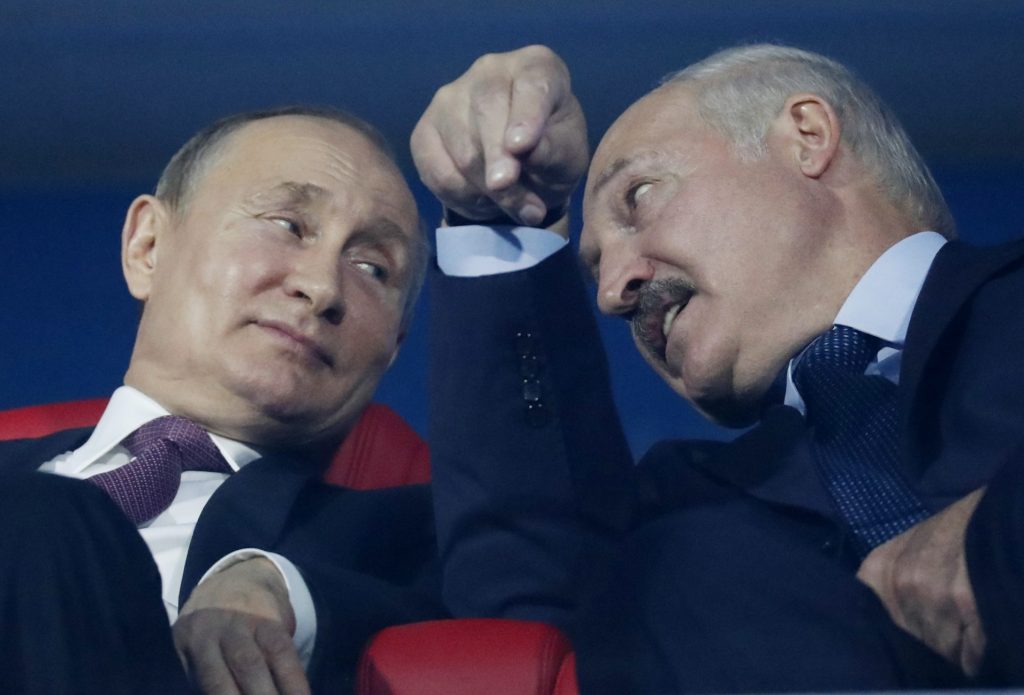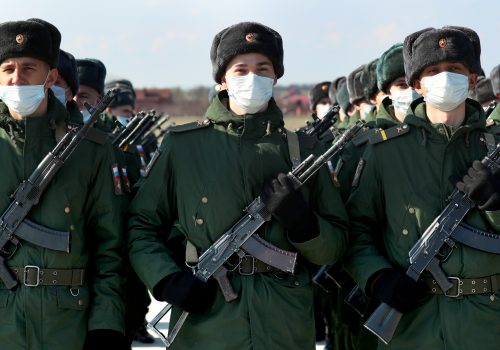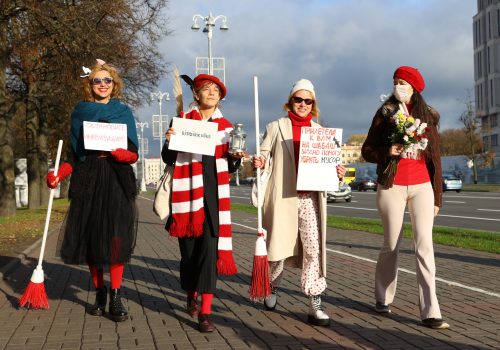Russia’s steady absorption and stealthy annexation of Belarus continues apace.
Russian Prime Minister Mikhail Mishustin and his Belarusian counterpart Roman Golovchenko are busy negotiating roadmaps to “deepen the integration” of the two countries’ gas markets and tax systems. Belarus is also seeking to build special terminals in Russian ports to facilitate the export of potash and refined petroleum products.
Kremlin-connected oligarchs and companies, meanwhile, are seeking to snap up the crown jewels of the Belarusian economy. Russian potash giant Uralkali is reportedly intensifying its long-term campaign to acquire Belarusian potash producer Belaruskali. The Russian chemical producer Uralkhem is said to have its eye on the chemical and fertilizer factory Hrodna Azot.
And as economic integration accelerates, Russia is also expanding its military footprint in Belarus, using a constant stream of exercises to establish a de facto troop presence. Meanwhile, Minsk and Moscow have agreed to establish a “joint training facility” in Belarus’s Hrodna region, near the Polish border.
This integration process is accelerating as both the United States and the European Union debate imposing additional sanctions on Alyaksandr Lukashenka’s authoritarian regime for its brutal crackdown on dissent after nine months of protests following last August’s contested Belarusian presidential election.
Taken together, this all raises an important question: Can sanctions against Belarus be separated from sanctions against Russia? Or should sanctions against the two countries be treated as part of a coherent whole, effectively sanctioning the Putin-Lukashenka axis?
The United States last month reimposed sanctions against nine Belarusian companies, including Belneftekhim, which accounts for 30 percent of the country’s industrial output. Also on the list were Hrodna Azot and the Naftan oil refinery. But conspicuously absent from the list was the potash giant Belaruskali, which commands approximately 20 percent of the global market. Also missing was the Mazur Oil Refinery, in which the Russian oil and gas company Slavneft holds a 42.58 percent stake.
The United States originally imposed sanctions on the nine Belarusian companies following the country’s 2006 presidential elections. At the time, Belaruskali managed to evade those sanctions when it was spun off from Belneftekhim, sparking an effort in the US Congress to re-impose new sanctions on the company. The push for sanctions on Belaruskali stalled in 2015 when Washington suspended sanctions on Belarusian companies following the release of several political prisoners.
Sanctions against Belaruskali and the Mazur Oil Refinery would have a substantial effect on the Belarusian economy and, therefore, could affect Lukashenka’s behavior moving forward.
It is unclear, however, whether sanctioning these large Belarusian state-controlled companies would drive them into the arms of Kremlin-linked companies and oligarchs, or conversely, whether it would deter Russian efforts to acquire them. It is also unclear whether the threat of sanctions against Russian firms and individuals who use Moscow’s power to acquire Belarusian companies as part of a Kremlin-backed effort to softly annex Belarus would be an effective deterrent.
There is some evidence that sanctions against Belarusian companies are impacting Moscow’s behavior. For example, Reuters reported recently, citing unidentified sources, that “Russian oil exporters may suspend supplies to Belarus’s Naftan refinery” due to US sanctions. According to the report, “Russia’s Rosneft and Surgutneftegaz do not plan to supply oil to Naftan in May” because they “are concerned they could be penalised if they continue dealing with Belarusian businesses.”
Eurasia Center events

In an important new report, Ilya Zaslavskiy, a senior fellow at the Free Russia Foundation, argues that support for Lukashenka’s regime should be a criterion for sanctions against leading Kremlin-connected oligarchs. Zaslavskiy identifies two individuals who he believes are particularly relevant in this regard: Dmitry Rybolovlev and Mikhail Gutseriev.
A native of Perm, Rybolovlev owned a controlling stake in the Russian potash producer Uralkali until 2011 when he sold his shares. According to Zaslavskiy’s report, “the Kremlin effectively cultivated Rybolovlev as Alexander Lukashenka’s biggest business partner in global cartel potash exports which sustained the Belarusian dictatorial regime with massive hard currency cash flows.”
Likewise, according to Zaslavskiy’s report, “Gutseriev’s Russneft oil company became the sole supplier of crude to Belarus. He has also set up a second large potash exporting business that crucially provides invaluable hard currency to Lukashenka’s depressed economy.”
Western policy towards Belarus, including Western sanctions policy, must thread a very difficult needle. On one hand, it needs to punish Lukashenka and his cronies for their abysmal human rights violations and incentivize the regime to change its behavior. At the same time, Western policy also needs to aim at preserving Belarusian sovereignty and preventing Russia from exploiting the crisis to de facto annex its smaller, but strategically vital, Western neighbor.
In light of these circumstances, sanctions against Belarus and Russia cannot be divorced from each other. The Putin-Lukashenka axis needs to be sanctioned as a unit.
Brian Whitmore is a Nonresident Senior Fellow at The Atlantic Council’s Eurasia Center, an Adjunct Assistant Professor at The University of Texas at Arlington, and host of The Power Vertical Podcast.
Further reading
The views expressed in UkraineAlert are solely those of the authors and do not necessarily reflect the views of the Atlantic Council, its staff, or its supporters.

The Eurasia Center’s mission is to enhance transatlantic cooperation in promoting stability, democratic values and prosperity in Eurasia, from Eastern Europe and Turkey in the West to the Caucasus, Russia and Central Asia in the East.
Follow us on social media
and support our work
Image: Russian President Vladimir Putin and Belarusian President Alyaksandr Lukashenka pictured in a 2019 file photo. (REUTERS/Vasily Fedosenko)




